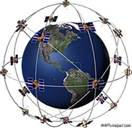Imagine the situation. You are driving a car along a desert or on a mountain. You have no idea you are. You passed the last house two hours ago. Then your breaks down. It is night and it is cold. You have no mobile phone. What do you do? Well, next time take a with you. This invention may be able to help you. It is a device(装置) which uses satellites to find the user’s position(位置). It can find your position to within 20 metres. A GPS cannot start your car, but at least you will where you are. GPS, which means Global Positioning System, is a small receiver. It looks like a mobile phone. You can hold it in your hand, or put in your pocket. It is sometimes put into a watch or a . We also find GPS devices in cars, planes, or boats. Some of these devices have electronic , so you know where you are. For example, in a city they can tell you the name of the .  There are parts to the Global Positioning System. The first part is the . You can either hold it in your hand have it fixed into your car, plane, etc. The second part is a group of satellites orbiting the Earth. The receiver contacts at least four of the satellites and calculates(计算) its position. The third part of the system is a network of ground stations. They are all over the world. They the satellites and make sure they are working well. Some people think that in the future the GPS will be as as the mobile. They are becoming and more and more accurate(精确的). There are also new uses for the GPS. Perhaps they will become like . Everyone will have one and you will never be lost again.
|
小题1:A
小题2:B
小题3:D
小题4:B
小题5:A
小题6:D
小题7:B
小题8:D
小题9:C
小题10:B
小题11:D
小题12:A
小题13:D
小题14:A
小题15:D
题目分析:这篇文章讲了GPS。GPS能够定位你的方位,所以能让你不再 迷路。它也是一个接受器,接收卫星发回的信号。文章还分析了GPS的构成以及发展趋势。
小题1:考查疑问词及对语境的理解。句意:你不知道你在哪。A.where在哪;B. what什么;C. who水;D. how怎样。表示地方,用where。故选A。
小题2:考查名词及对语境的理解。句意:这时你的车坏了。A.ship船;B. car汽车;C. train火车;D. plane飞机。由上句:You are driving a car,可知,你开的是车,故选B。
小题3:考查名词及对语境的理解。句意:下一次,随身带一个导航仪。A.watch手表;B. ring戒指;C. clock 钟表;D.GPS导航系统。根据下文:. A GPS cannot start your car, 故选D。
小题4:考查动词及对语境的理解。 句意:至少你会知道你在哪。A.advise建议;B. know知道,了解;C. represent代表;D. speak说。导航仪能让你知道方位,故选B。
小题5:考查名词及对语境的理解。句意;GPS是一个小的收音机接收器。.A.radio收音机;B. TV电视;C. robot 机器人;D. machine机器。根据receiver可知,GPS有接收功能,只有收音机有接收功能,功能最接近。故选A。
小题6:考查名词及对语境的理解。句意:在口袋里我们有时会放入一只表或者一个手机。A.room房间B. office办公室C. road道路D. mobile phone手机,根据现实情况,口袋里放的是手机。故选D。
小题7:考查名词及对语境的理解。句意:这些装置有时有电子地图。A.parts部分;B. maps 地图;C. video 录像;D.music音乐。根据:so you know where you are.可知带有的是地图,故选B。
小题8:考查名词及对语境的理解。句意:例如在一个城市里他们能告诉你街道的名称。A.studio工作室;B. teenager青少年;C. bus公交车;D. street街道。根据导航仪的功能,故选D。
小题9:考查数词及对语境的理解。句意:导航仪包含三个部分。A. five五;B. four四;C. three三;D. two二,根据The third part of the system ,故选C。
小题10:考查名词及对语境的理解。句意:第一部分是一个接收器。A. sender发送者;B. receiver接收者;C. Internet电脑;D. system系统。根据第五题可知, 故选B。
小题11:考查连词及对语境的理解。句意:你能把他拿在手中,也能固定在车上,或飞机上。A.and 和,又;B. then然后;C. but但是 ;D. or 或者。either....or...两者选其一,故选D。
小题12:考查动词及对语境的理解。句意:他们控制卫星,确保卫星正常运行。A.control控制;B. achieve达到;C. allow允许;D.imagine想象。根据卫星的作用,是用来控制的,故选A.
小题13:考查形容词及对语境的理解。句意:将来GPS将会像手机一样普及。A.expensive贵的; B. special特殊的;C. new新的;D. common普通的。根据现实中手机的特点,故选D。
小题14:考查形容词及对语境的理解.句意:他们会变得越来越便宜,也越来越精确。A. cheaper更便宜;B. easier更容易;C. more expensive更贵的;D. bigger更大的。根据上一句,会像手机一样普及,可知是便宜,故选A。
小题15:考查名词及对语境的理解。句意:GPS可能会变得像手表一样A.computers电脑;B. robots机器人;C. satellites 卫星; D. watches手表。根据:Everyone will have one and you will never be lost again.可知,这是手表的特性,故选D。
